Vocations are the classes of Dragon’s Dogma 2 and decide what kind of combat you’ll be using, along with the Weapon and Core Skills you’ll be able to unlock. For this reason, it’s a good idea to figure out what is the best Vocation for you in Dragon’s Dogma 2.
You can choose the Vocation for both the Arisen and your Main Pawn during the opening hour of Dragon’s Dogma 2. Thankfully, you’re not tied to this decision and can change both Vocations whenever you like through respeccing.
If you’re planning out your Main Pawn in particular, then it’s worth checking out our best early game Pawn build recommendations. We’ve also listed all of the Vocations, including how to unlock them.
Below we take a look at both the best early game and late game Vocations in Dragon’s Dogma 2.
On this page:
Best early game Vocations in Dragon’s Dogma 2
When you first start Dragon’s Dogma 2, you’ll only have access to four Vocations – Fighter, Archer, Mage and Thief. The answer to which one is best for the early game, however, is subjective to you based upon the type of combat you wish to play. (Sorry, annoying answer I know.)
Before we take an individual look at these four Vocations, there are some important details to note. The first is that it’s worth changing your Vocation every so often; not only to experiment with the different combat styles Dragon’s Dogma 2 offers, but to unlock additional Augments since they can be used across Vocations. This means if you unlock a Mage Augment but switch to the Thief Vocation, you can still apply this Augment. Since you can have up to six Augments, it’s a good idea to do some mixing and matching to create your perfect build.
Secondly, each Vocation has 10 Ranks – the higher your Rank, the more Weapon Skills, Core Skills and Augments will be available to you. A Vocations Rank is raised by using said Vocation in combat. It’s important to remember that Vocation Ranks are not shared between the Arisen and the Main Pawn. This means you’ll always be starting from Rank 1 when you choose a new Vocation. Thankfully, your Rank progress is saved when you switch Vocation, so you’re free to jump back and forth as much as you like.

Thirdly, it’s a good idea to have your Main Pawn’s Vocation complement your own to ensure you’re covering your weaknesses. If you go for the melee-focused Fighter, for example, then consider having your Main Pawn be an Archer to include some ranged attacks in your team. The Main Pawn’s Vocation, like the Arisen, can be changed as many times as you like and our how to change Vocation guide will walk you through the process. We also have some early game Pawn build recommendations.
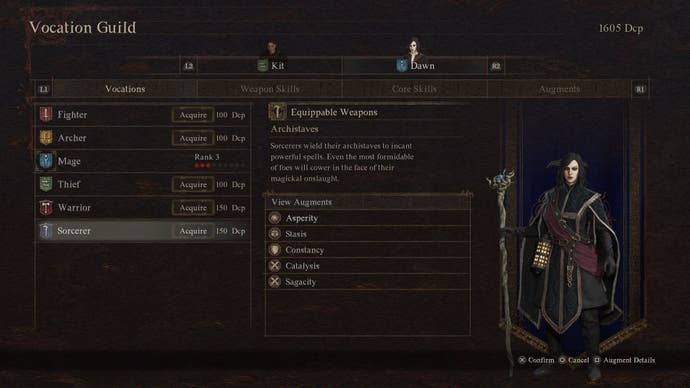
Personally, I started Dragon’s Dogma 2 as a Thief because I like fast paced combat. Meanwhile, my Main Pawn was a Mage due to their healing capabilities and the elemental boosts they could provide for my own attacks. I later switched to a Sorcerer – a decision partly driven by my desire to wear a cool hat and want to experiment with a different combat style. At the same time, I switched my Main Pawn’s Vocation to Thief since I wanted to fill the melee defence spot I had opened up in my party and the knowledge I had gained while playing as one helped me craft their new build. (Also I could switch over my equipment, so I’d have more money saved for the future hat.)
With that out of the way, let’s take a look at the starting Vocations in Dragon’s Dogma 2:
Fighter
Fighter is perfect for anyone who prefers a balanced approach to up-close melee combat thanks to how it allows you to wield a shield. Due to this, Fighters have the ability to defend against up-close enemy attacks. This means you can deflect oncoming attacks and, in doing so, potentially create an opportunity for you to exploit an enemy’s weaknesses. You’ll want to keep an eye on your Stamina when defending though, because, not only will it recover slowly, but you’ll lose Stamina if your shield takes a hit.
You also have the ability to conduct follow-up attacks when playing as Fighter if your opponent is down, knocked off balance or not expecting your attack. Once again, this grants you the perfect chance to unleash some strong Weapon Skill. The downside, however, is that it will leave you vulnerable for a short period of time.

If you’re planning on playing as Fighter, then consider having your Main Pawn be either an Archer or a Mage. An Archer will provide useful range attacks, lowering the enemy’s health while you deal your own blows, while the Mage has the ability to heal you.
Here are the Fighter Augments:
- Mettle – Augments your physical Defence.
- Provocation – Increases the likelihood of being targeted by foes.
- Thew – Enables you to carry additional weight.
- Dominion – Allows you to lift up and pin down foes for an extended duration.
- Diligence – Hastens recovery when downed or crawling.
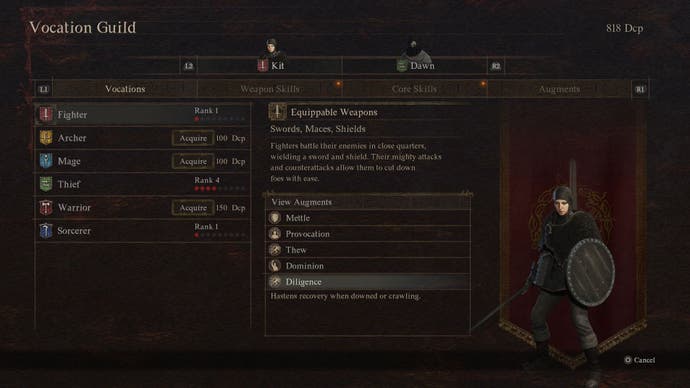
Archer
The Archer Vocation is focused around range combat. (Not surprising really, it’s not like one of your attacks is going to be blasting a Radio 4 drama about farming.) When playing as an Archer, it’s best to position yourself on the battle’s edge rather than becoming trapped in the middle of combat. This will allow you to focus on taking down enemies from a distance to create openings for your allies and pawns.
As you increase your Rank as an Archer, you’ll be able to gain new Weapon Skills and find arrows which will let you inflict debilitations upon your enemies, such as sleep or simply setting them on fire. This effectively allows you to control the battlefield from a safe distance if done correctly, especially since you have the ability to quickly switch between targeted foes. It does, however, require good Weapon Skill management as using these will help your arrows fly further and deal more damage. You can also use Steady Shot to focus on an enemy’s weak spot to, once again, support your allies in their attacks.
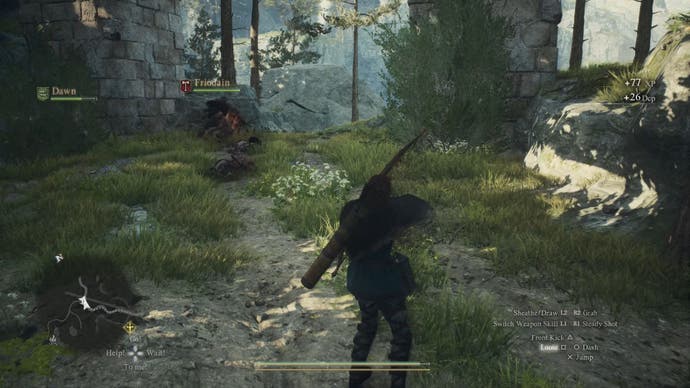
Being an Archer comes in quite handy during the opening hours of Dragon’s Dogma 2 since you’ll find yourself encountering a number of harpies. Since harpies can fly, being an Archer will give you an advantage against them compared to the melee-focused Vocations since you can literally shoot them out of the sky. Though, it’s important to remember that Dragon’s Dogma 2 is an open world game, so you shouldn’t pick your Vocation based on this fact alone.
If you do decide to become an Archer, then it’s a good idea to have your Main Pawn’s first Vocation be either Fighter or Thief. This will allow them to jump into the heat of battle, while you support them from the sidelines.
Fancy playing as an Archer? Then check out our best Archer build recommendation.
Below you’ll find the Archer Vocation Augments:
- Ambuscade – Increases damage dealt by your attacks when targets are not in battle stance.
- Endurance – Increases your maximum Stamina.
- Radiance – Causes your lantern to consume less oil and illuminate a wider area.
- Lethality – Increases damage dealt when striking a target’s vitals.
- Avidity – Enables you to clamber up cliffs and scale foes and other surfaces more quickly.
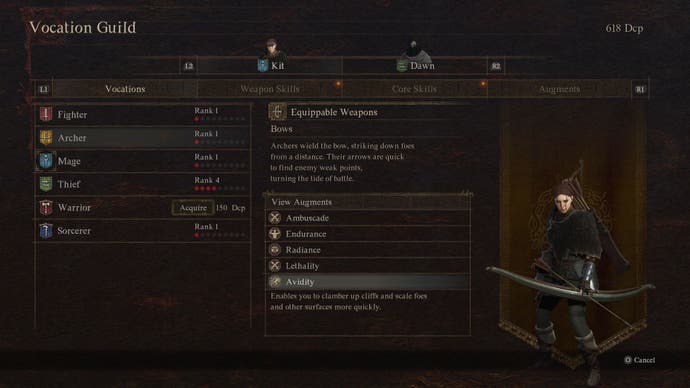
Mage
The Mage Vocation can be seen as a mixture of a support and combatant Vocation due to how it allows you to both give and take health. You’ll have a range of spells at your disposal that will deal damage, but can also grant elemental abilities to your Pawn’s weapons for a short amount of time. Curative Magick will also allow you to heal both your own and your Pawn’s health – just make sure they’re in range when you cast it!
When playing as a Mage, it’s very important to remember that spells take time to cast. On top of that – the more powerful the spell, the longer it will take to cast. (The same rule is applied to the Sorcerer Vocation.) While you can move while spell casting, this will also increase the time it will take to do so. For this reason, like with being a Archer, it’s a good idea to avoid the midst of combat when playing as a Mage, because, even though you can heal yourself, you will be quite vulnerable. Thankfully, some spells allow you to change targets while enchanting, so, by keeping an eye on enemy health bars, you’ll be able to decide where best to aim your attack.

Like the Archer, it’s worth having your Main Pawn be either a Fighter or Thief if you’re playing as a Mage. This way you’ll have someone defending you while you focus on casting spells. Though, you may also want to consider having a fellow Mage in your Pawn party as casting the same spell alongside them will decrease the amount of time it will take to cast.
Below lie the Mage Augments:
- Apotropaism – Augments your Magick Defense.
- Beatitude – Increases the amount of Health recovered by curatives and curative magicks.
- Intervention – Reduces the duration of debilitations you are afflicted with.
- Perpetuation – Extends the duration of enchantments and invigorations.
- Exaltation – Augments your Stamina recovery speed.
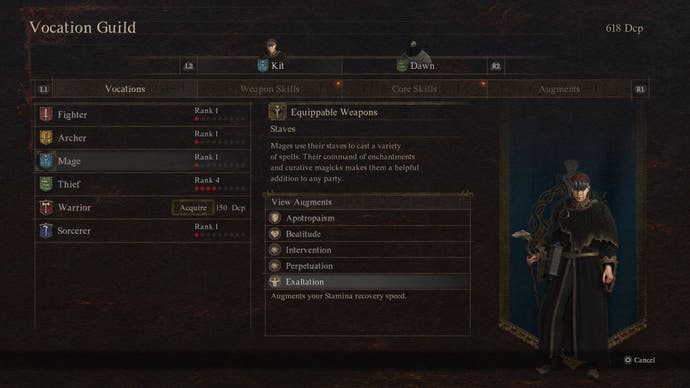
Thief
Thief is a melee-combat focused Vocation, but, unlike the Fighter, you won’t be able to use a shield. Instead, you’ll be focusing on dealing strong attacks quickly and dodging enemy attacks or using your abilities to hide from enemies completely. For this reason, you’ll want to keep a good eye on your Stamina when playing as a Thief.
As mentioned, the key to playing as a Thief is knowing when to attack and when to flee. Thankfully, the Swift Step ability helps you quickly dodge enemy attacks or reposition yourself around foe before dealing some deadly damage. You can also use the Twin Fang attack to pin an enemy to the ground before inflicting some more damage. This will, however, leave you vulnerable to enemy attacks, so it’s best to avoid doing so if you’re surrounded by enemies.

Thieves can also use Twin Fangs to cling to larger enemies where you can unleash one of their many Weapon Skills. Some of the skills have the ability to inflict debilitations, so you’ll want to make sure your Weapon Skills are balanced. Like Fighters, the Thief Vocation also has the ability to inflict follow-up attacks if an enemy is downed, knocked off balance or not expecting your attack at the risk of leaving you vulnerable.
When it comes to choosing your Main Pawn’s Vocation, the Thief works best with the Mage, thanks to the healing and elemental boosts they offer, or, once you’ve unlocked it, the Sorcerer due to how this Vocation can replenish your lost Stamina.
Here are the Thief Augments:
- Subtlety – Decreases the likelihood of being targeted by foes.
- Gratification – Slightly restores Health when you deliver the killing blow to a foe.
- Poise – Reduces the Stamina consumed when struggling in a foe’s grip.
- Vigor – Reduces the Stamina consumed when clinging to or pinning down foes.
- Verve – Augments your Strength.
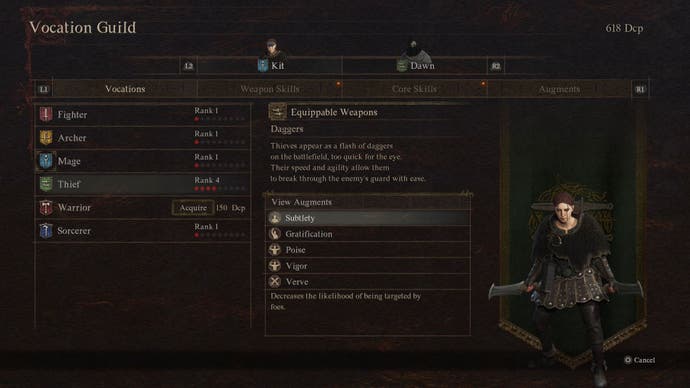
Best late game Vocations in Dragon’s Dogma 2
You’ll find yourself unlocking six additional Vocations as you journey through the world of Dragon’s Dogma 2 and, by the time you’ve reached the game’s late stage, you’ll hopefully have access to all 10. Which Vocation is best for you, however, is still a subjective matter, especially since you’ll have been crafting your Main Pawn’s build alongside your own.
You may find that you wish to remain with one of the starting Vocations, such as Thief, since you’ve unlocked the majority of its Weapon Skills and know how to apply them in combat best. On the other hand, you may have enjoyed jumping between the different Vocations and have unlocked a variety of different Skills and Augments. If this is the case for you, then you might want to consider becoming a Warfarer due to how they can use any weapon and skills from any Vocation. The downside, however, is that they have lower base stats compared to the other Vocations.

If you’d prefer to focus on playing a more support role, however, then consider the Trickster. This Vocation focuses on confusing your enemies by creating illusions, while providing useful bonuses for your Pawns, such as attack boosts. Meanwhile, if you love range combat, then the Magick Archer might be the way to go. This Vocation marries arrows with magic to create some powerful long-range attacks, while still offering you the chance to heal your allies. It’s also possible to create a custom skill which, in exchange for your maximum HP, can unleash some extensive damage.
Finally, the Mystic Spearhead gives you the chance to mix melee with magic. Here you’ll be able to wield a Duospear which, along with whacking enemies, can inflict status effects and toss objects. We recommend experimenting with these final four Vocations as they offer some of the most diverse combat in the game while allowing you to make use of the knowledge you’ve gained from the other Vocations.
 Dragon’s Dogma 2 Gameplay Preview – MAGICK ARCHER AND MYSTIC SPEARHAND WEAPON SKILLS DEEP DIVE
Dragon’s Dogma 2 Gameplay Preview – MAGICK ARCHER AND MYSTIC SPEARHAND WEAPON SKILLS DEEP DIVENo matter which Vocation you find yourself leaning towards, it’s a good idea to seek out its Vocation Master. Gaining their trust will eventually allow you to unlock new, powerful, skills for that specific Vocation which can really give you an edge in combat.
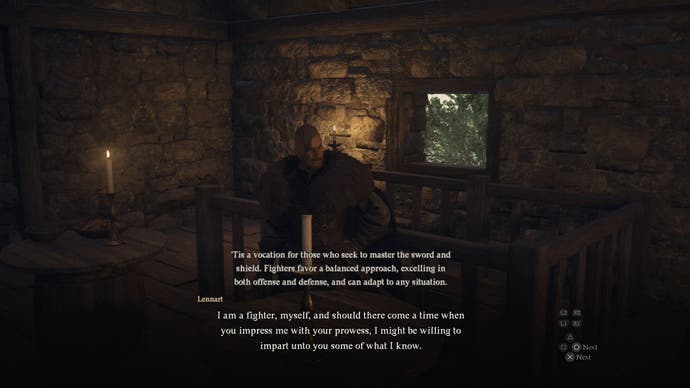
We still recommend ensuring that your Main Pawn’s Vocation compliments your own since they, along with the Arisen, are the core members of your party. After all, while you can hire other Pawns, only your Main Pawn will level up. Now is also the time to take Pawn Specialisations into account as these can come in quite handy on your journey.

One important fact to remember as you move into the latter stages of Dragon’s Dogma 2 is that, outside of the starting Vocations, the only additional Vocations your Main Pawn can learn are Sorcerer and Warrior. For this reason, we’ve taken a in-depth look at these two Vocations below for whether you wish to use them yourself or apply them to a Main Pawn:
Sorcerer
In many ways the Sorcerer Vocation is an attack focused upgrade to the Mage. Using it will allow you to deal magic attacks over wide areas with the aim of targeting multiple enemies. Depending on the spell, you may also be able to inflict debilitations. Much like the Mage, some spells allow you to switch targets and you can reduce casting time by being near a Sorcerer using the same spell.
The main difference between the Sorcerer and the Mage, however, is that, instead of recovering health, Sorcerer’s recover Stamina. Galvanize allows you to recover Stamina whenever you like and comes in handy when casting more powerful spells – power equals Stamina after all.
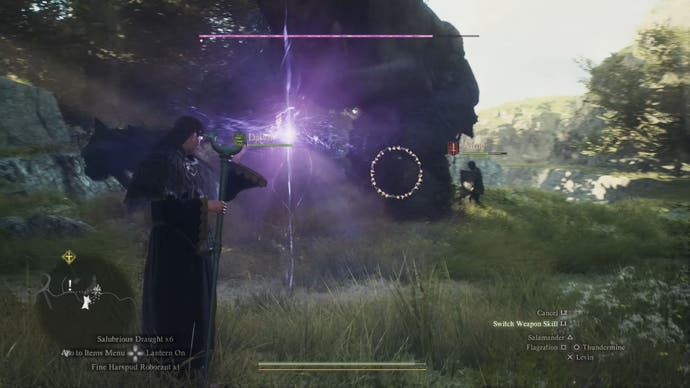
Overall, the Sorcerer is perfect for anyone wanting to use magic for violence rather than support. When choosing your Pawns, you’ll want to ensure you include at least one melee attacker to ensure they can defend you when casting spells. You may also want to consider having a fellow Sorcerer, so you can benefit from the reduced casting time.
Here are the Sorcerer Augments:
- Asperity – Increases the likelihood of inflicting debilitations with your attacks.
- Stasis – Reduces the rate at which items deteriorate.
- Constancy – Augments your Knockdown Resistance.
- Catalysis – Increases damage dealt when exploiting a hostile target’s elemental weakness.
- Sagacity – Augments your Magick.
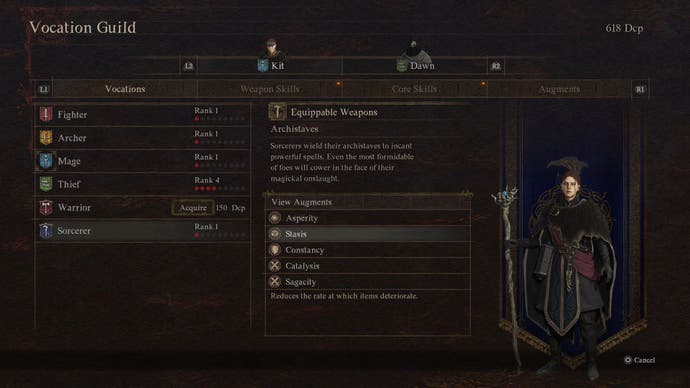
Warrior
Being a Warrior is all about taking the lead in battle and using the advanced range your massive sword gives you to attack multiple enemies. The negatives come in the form of a reduced attack speed and, even with the increased health Augment, a Warrior can not survive alone for long.
There are two attacks you should be aware of if you fancy playing as a Warrior. The first is Charged Slash – a strong attack that can deal a good amount of damage, with the added bonus that, while you’re charging it, you’ll have increased resistances and are less likely to flinch. The second is Barge which, while less powerful, is a far quicker attack and benefits from the same resistance bonuses as Charged Slash.

In many ways, the Warrior is an advanced version of the Fighter – much like how the Sorcerer is for the Mage. You can even still use follow-up attacks if the foe you’re facing is unaware of your existence, knocked back or downed. When it comes to selecting your Pawns, it’s a good idea to include some ranged based attacks in the form of Archers or Mages to make sure you’re covered when entering the fray.
Below you’ll find the Warrior Augments:
- Vitality – Increases your maximum Health.
- Impact – Improves your ability to push and pill targets when grabbing hold.
- Pertinacity – Improves your ability to break through an opponent’s guard.
- Dominance – Augments your Knockdown Power.
- Intrepidity – Reduces cumulation of the loss gauge when receiving damage.
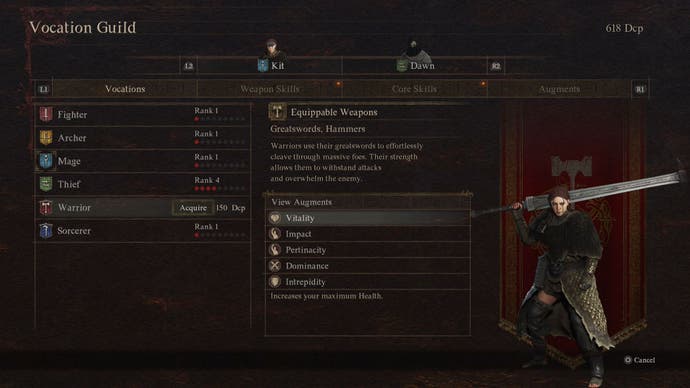
Good luck finding the best Vocation for you in Dragon’s Dogma 2!


